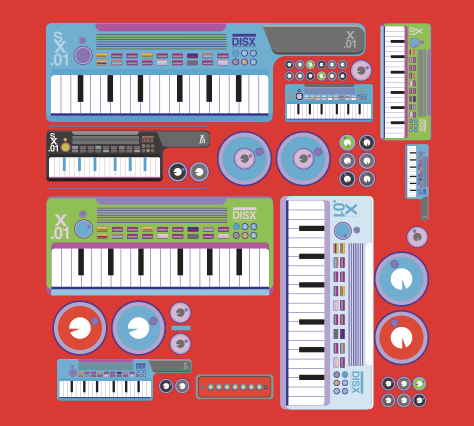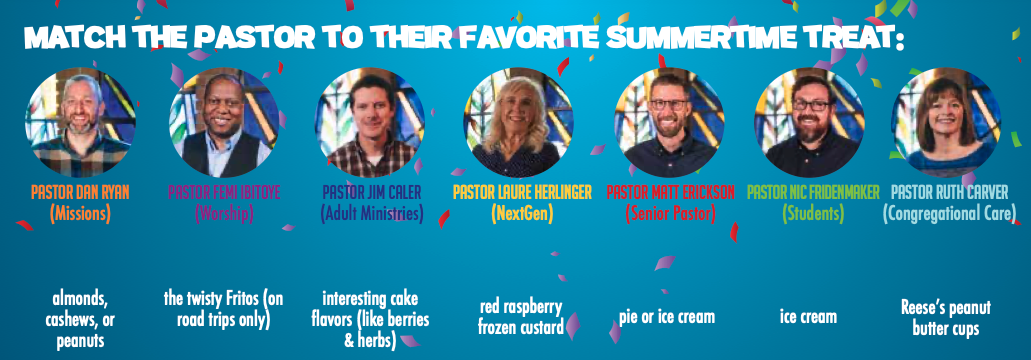Erica Breitbarth is a music educator, choral conductor and vocalist in the Milwaukee area. In addition to her work at Reagan High School, she is a worship leader and Council Member at Eastbrook, and was selected as one of ten finalists from around the country for the 2017 Grammy Music Educator Award. She recently sat down with us to talk about what it means for her to be a light for Christ as she seeks to proclaim and embody the love of Jesus Christ through her work in the city of Milwaukee.
How has God specifically called you to be His light?
The underlying factor of my whole career working in education has been this idea of surrogacy—being a surrogate parent to kids regardless of whether they have great parents, not-so-great parents, or no parents. I believe God has specifically called me to be someone who fills in that space for people. And I know that this calling was placed on me by God because that word, “surrogate,” is such a weird term! I know it’s not something that I came up with on my own, but it is something that has been imprinted on me in my vocation.
Not everyone would qualify what I do as ministry. I’m not a pastor, I work in a public school, and I’m not allowed to talk openly about my faith. But I see my work as ministry. I’m seeking to be a person of faith in a dark environment. Both inside my work and in other areas of my life, I want to be a voice for people who don’t have one. I believe I do this on the [Eastbrook Church] Council, as the only single woman as well as the only millennial. It is a labor of love sometimes, but showing up in that space is a part of my vocation as well.
One of the reasons why I feel a lot of clarity about my vocation is because of Eastbrook. I was a high school kid who lived in the suburbs, but because of the diverse community at Eastbrook, I was friends with a lot of people who went to King, Riverside, and High School of the Arts and I made music with them. I loved it! From the moment I got to Eastbrook, a heart for the city of Milwaukee was ingrained in my DNA as a Christian. Eastbrook has been such a big part of my theological journey and I owe a lot to this church for that. It is an honor to get to be back in the Eastbrook community, serving and being a part of it, living out my vocation, being strengthened in community, and in particular by the way that this community values diversity. Eastbrook looks like the world and I just couldn’t go to a church that didn’t!
How do you go about living out your calling?
Creating safe community space is so important in my work. We don’t have enough spaces, especially in the city, for strong community to happen. For me, I teach music and I love music, but music is a conduit for community.
Getting kids from all different parts of the city, with different backgrounds and socioeconomic statuses to come together and make art together is really hard. Sometimes things don’t go well, but I see it as an opportunity to teach my students how to navigate conflict in a safe place where they can have the freedom to make mistakes.
When they go out into the world where the stakes are higher, they’ve had a chance to test that out. Especially with students who come from impoverished backgrounds, they don’t have the same safety nets [I had]. They have to be ready to be an adult when they turn 18. I didn’t have to be an adult until I was 22 or later, but they don’t have that option. I think showing them how to interact with others, how to advocate for themselves, how to fail gracefully, get back up, and how to be emotionally healthy is the biggest part of what I do. Music is just the way that I do it. We come around something (music) that they buy into and I get to cultivate a safe space where I can empower my students. That’s what my role is.
The metaphor of light implies that there is darkness. How does darkness reveal itself in your context?
I’ve been teaching in MPS for 8 years and I see MPS as a reflection of our city. It has a lot of brokenness built in—not necessarily because of the people who work in MPS, but because of the poverty, racism, and systemic oppression that exist in our city. The more I spend time in that space, the more I come to understand the darkness better. As I get to know my students, I get to know the brokenness in their lives. And as I get to know the brokenness of the system, I get to know how hard it is to change a broken system.
Sometimes someone will ask me how we’re going to fix the system and my answer is never that we’re going to fix it—evil in the world, systemic racism, poverty—but my job is to be a little bit of light in a broken system.
I’m not going to change the whole system, though I would love to! But if I spend my energy and my bandwidth thinking about all the ways in which it doesn’t work, I wouldn’t get up in the morning!
I’ve seen that hopelessness crush people before, and I think some of that has to do with a lack of faith. If we look at the system as if it is just about fixing problems for the here and now, it’s totally awful. But if we look at it in light of who God is, and the fact that our job as broken people is to bring a bit of the kingdom of God into our space, there is no pressure to fix the whole thing. Instead, I just feel the pressure to be present today, to do the things for my students today that I think Christ would do in my situation. So, rather than get discouraged, I look at my 200 kids. They are the ones I get to serve.
I find that many millennials have this “just add water” mentality about change. They are very aware and woke to the problems that exist in our system but they want credit for the thing that they’re going to do that will change the world—they have a superhero mentality. But true change doesn’t happen overnight, it requires that we abide and remain. Perseverance is not always a value in our culture, yet I believe that one of the only ways that you can make positive, long-term change is by abiding. You have to be in a system long enough to understand the brokenness to really impact change. You can’t just come in for the short-term and make change. This short-term superhero mentality hurts the system—it’s disruptive and doesn‘t help.
In what ways has God equipped you to be His light?
God has given me an enthusiasm for music and kids that I get to use every day. I am excited about the music that we’re making, but also about the kids that I’m around. That energy and light can only come from Christ. There is no way that I could get up at 5 am and wave my pom-poms for 12 hours a day without Christ. I am 100% convinced that if I were not a Christian, I would have quit 3 years in. My friends and coworkers who are not people of faith—I have no idea why they’re still here. What motivates them?
We have a God who sacrificed and suffered and so we have a different theology. If it was about me and feeling appreciated and cared for, this would not be the job to choose. But I am okay with the sacrifice required in my work because there’s a bigger purpose and there’s fruit.
I also think that my singleness is a gift. There is so much need for relationship, mentorship and parenting for some of the kids that I work with. My job would change if I had kids or if I were married. The fact that I can go home and recharge and come back the next day ready to pour into my kids—that is a gift.
How do you understand the relationship between proclaiming and embodying the love of Jesus Christ?
By nature, my job is more about embodying than proclaiming. But I also have had opportunities to proclaim who Christ is because I have students who are people of faith and students who have questions. I’m not allowed to pray with my students or prosthelytize, but I have had many spiritual conversations with my students because they’ve initiated it. I’ve had conversations about what it means to be a Christian and an artist, what it means to be a Christian in a public school, and what my personal theology is on certain tough issues my students are struggling with like sexuality, racism, and gender. I also have colleagues who are people of faith. I work with another Christian and we have the opportunity to speak into each other’s lives, to encourage each other, to pray for one another and for our kids.
So there are opportunities, but they are a little more covert, that’s just the nature of it. I really wish that more people would see the covert opportunities that we have in secular environments and take them. We often have this perspective that you’re not doing ministry unless you’re in the church. But we are all called to be Christ-like in spaces that are not Christian. It’s really hard sometimes, but I think it’s important. We have to share the light of Christ in all spaces.
Christians are often perceived in our culture as proclaiming all the time and we are not seen as embodying our beliefs; we’re seen as being only about words and not about actions. I’ve started to care a lot more about the concept of a lived theology—that my words about who Christ is don’t mean anything unless my life is guided by those principles. This is modeled by Jesus in His own life. He lived and abided with people over the long haul—He lived out His theology. I think part of how we counteract the cultural perception of Christians is through a lived theology where we focus more on embodying first and proclaiming second.
I don’t mean this as a cop-out for proclamation, but I think that right now, the world sees us as proclaiming all the time and they don’t see us embodying Jesus’ love. And so many people, especially millennials, are responding to that by emphasizing the embodiment of the love of Jesus Christ in the city and in the world. That‘s what I hope to do as well, in the space where God has called me. As a musician, I would pick a way cushier job if it wasn’t about Christ’s call on my life. But I know that I am supposed to abide here and I can do that because of Christ in me—I’m not a superhero. ■
Recommended Posts

Summer Mixtapes
June 7, 2024

Pastors: They’re Just Like Us!
June 7, 2024

What’s in Your Bible?
June 7, 2024


